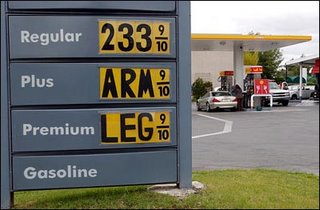Eat Here & Get Gas

Americans are angry about skyrocketing prices for gasoline, home heating oil and other fuels, expecially post-Hurricane Katrina. As a result, on November 9, the heads of the 5 families, er, U.S. oil companies, Exxon Mobil, Chevron, ConocoPhillips, BP America and Shell, were called before a joint hearing of the Senate Energy and Commerce Committees to testify about why the price for their product is so high and why they are earning record profits. It was quite a dog and pony show by the Senators. Republican Senators, who every day accept large contributions from these dons, er, CEOs, wanted to demonstrate that they care about ordinary Americans, with Congressional elections less than a year away and the poll numbers for their party and President Bush in the, um, tank. But the Republican Senators' bias quickly showed, as these Senators did not, over the Democrats' objections, even require the CEOs to testify under oath. Democrats, many of whom really do care about ordinary Americans but, with a minority in each house, are not in much of a position to do anything about it, nevertheless took the opportunity to excoriate the witnesses.
The spectacle was laughable. Senator Barbara Boxer (D-CA) asked the executives if they would pledge voluntarily to donate a portion of their salaries and bonuses to help poor folks meet their gasoline and home heating bills this winter, when fuel prices are expected to increase stratospherically. In other words, Boxer asked these businesses to become charities. Businesses exist only to make money, as much as possible. There is no evidence thus far that the oil companies are violating the antitrust laws, by, for example, colluding to fix high oil prices. The oil companies don't have to -- they can charge high prices legally on their own. Another senator, Byron Dorgan (D-ND), has introduced legislation that would impose a 50-percent excise tax on the windfall profits earned by U.S. oil companies on the sale of all barrels of crude oil derived from existing wells. Windfall profits would be defined as anything over $40 per barrel. Such a tax has no chance of passage in the current Congress, which is dominated by the GOP, and even if it did, the oil windfall profits tax would face a veto from President Bush, whose economic strategy is to cut taxes for the wealthy and massively increase government spending, often in the form of government contracts to corporations run by those same wealthy, thereby running up the largest deficits in the nation's history.
As well-intentioned as some of these Democratic congressional oil company proposals are, they miss the point: Americans are fat. Americans are gluttons. Americans are consumers. Americans are addicted to oil. America has 4% of the world's population but we use 25% of the world's energy. And it's not just the size of Americans' Hummers and other vehicles, which dwarf motor vehicles in other countries. It's also the size of Americans' bodies and our meals. According to the latest government studies, 60% of Amercians are overweight, and 30% are in that super category, obese. Now, we are constantly bombarded by media advertising images and messages telling us to consume more of everything: SUVs, Big Macs, cigarettes, beer. The bigger, the better. Whatever it is, Supersize it. Americans are conditioned that massive consumption is the American way. Hell, it's even patriotic. 2 weeks after 9/11, Bush told Americans to: "Get on board. Do your business around the country. Fly and enjoy America's great destination spots. Get down to Disney World in Florida. Take your families and enjoy life, the way we want it to be enjoyed." It's no wonder that America's savings rate per family is negative.
Do America's leaders ever tell teh American people to conserve fuel or other precious resources? Not the GOP, which runs the White House and both houses of Congress. Not President Bush, other than on one recent occasion, when he was being hammered for incompetence and elitism after Katrina. President Bush, after all, was in the oil business, as was Bush's dad, as are many of the fatcats who got Bush elected and keep sending a portion of those record profits his way. Not Vice President Dick Cheney, former CEO of oil services behemoth Halliburton. Not Secretary of State Condoleeza Rice, former director of Chevron, who has an oil tanker named after her. Not Congressman Tom DeLay, who is similarly bankrolled by the Texas oilmen. The more Americans consume, the more money these oilmen make, and the more likely the politicians they bankroll will stay in power, making them more money. It's a perfect vicious cycle. Likewise, Americans shouldn't expect oil company executives to promote the development of alternative energy sources by their competitors. The big 5 oil companies have almost all of the U.S. market, why on (or under) earth would they or their politician patrons jeopardize that? Not surprisingly, the GOP plan is to drill for more oil, including in the Arctic National Wildlife Refuge. Republicans have no problem threatening this delicate ecosystem for a relatively paltry amount of oil that would not be available for many years. Obviously, America cannot achieve energy independence or stability by drilling for more oil -- we simply don't have enough oil. And forget about the oil companies or the Republicans doing anything about global warming, which, by the way, may be contributing to the strength of those very hurricanes that knocked out oil production that led to skyrocketing gas prices. Another nice vicious cycle.
But none of this should surprise voters. Americans knew all of this during the 2000 presidential campaign. The GOP and many voters made fun of Al Gore for warning about oil shortages, energy crises and global warming in his book Earth in the Balance: Ecology and the Human Spirit. The fact is, Americans don't want to face America's oil addiction, and few people want to hear about any lifestyle adjustment, no matter how modest, that might be necessitated in order to conserve a little bit of oil. But after being smacked with hurricanes and $3.70 premium gas, it's getting harder to ignore.
So what can Americans do about this? First, Americans can elect new leaders, and demand that they and our current leaders take steps to wean us off oil instead of the present policy of strengthening our addiction. These leaders could, for instance, impose bigger gas-guzzler taxes on cars, and subject SUVs to the tax. That's right, gas-guzzling SUVs are not subject to the gas guzzler tax! On the contrary, giant SUV's are eligible for a crazy tax credit! That's right, guzzle more gas, get a tax credit. It's such an American idea. Can't we all agree to get rid of this tax credit? America's leaders could also increase the federal Corporate Average Fuel Economy (CAFE) requirements for cars and SUVs, even just a little bit. The leaders could come up with an Appollo Progam-like massive R&D effort to reach specific benchmarks for reducing oil consumption and developing alternative energy sources by a date certain. Democrats are more likely than Republicans to have specific ideas and the desire, as well as fewer financial conflicts of interest, to do this. But no U.S. leaders will do any of this unless enough voters demand it.
Likewise, Americans can educate ourselves and demand that America's leaders clearly explain the dangerous connections between U.S. involvement in the Middle East, 9/11, two Iraq Wars, and oil. Why else did Saddam Hussein invade oil-rich Kuwait? Why else did the U.S. send troops to Kuwait to stop him? At the time, Secretary of State James A. Baker (now a business partner of George Bush Sr. at the Carlyle Group), in a rare moment of candor in explaining why the U.S. had invaded Kuwait, said "If you want to sum it up in one word, it's jobs." Of course, what he meant was oil, since the price of oil affects the U.S. economy, and the number of jobs the economy can sustain, perhaps more than any other single factor.
America's leaders could also explain how Al Quaeda achieved popularity when, during the first Iraq War, U.S. troops ("infidels" in the Al Quaeda vernacular) set foot on the soil of the land of the two mosques in order to protect Saudi Arabia from possible invasion from Iraq. The troops were sent there to protect Saudi Arabia's oil, so that this oil would keep flowing to the U.S. so that America could keep consuming, you get the picture.
Or perhaps Americans don't need to wait for our leaders to become courageous and ignore their own financial incentives. Perhaps Americans can take steps ourselves to conserve fuel and lessen our own demand. We could drive slightly less. We could carpool sometimes. We could take public transportation once in a while. We could walk or bike 4 blocks to the corner store for a quart of milk every now and then, instead of driving there. We could drive with a lighter touch on the gas pedal instead of speeding to the next red light. Americans could buy slightly smaller cars and SUVs. We could maintain our cars a bit more carefully, and monitor our tire pressure a bit more often. We could inspect our houses, windows and heating appliances to make sure that our homes are energy efficient and do not leak excessively. We could cut down slightly on our massive use of electricity, which is a hidden form of dual energy consumption since oil, or coal, or nuclear or hydroelectric power, is needed to drive the giant turbines that generate electricity. While many had said the Internet age would usher in the age of telecommuting and thereby reduce oil consumption, they failed to tell us that America's use of oil and other energy consumption would explode in order to generate electricity to run all those computers. Can't we at least make sure the computers are turned off or are in sleep mode at night, and that, when not in use, the typewriters and lights and radios and televisions in our offices and homes are turned off as well?
Note how these energy-saving steps do not involve a radical lifestyle change or pie-in-the-sky idealism. They involve mostly small changes that can realistically be achieved. Each one might not sound like much. Think of it as losing a few pounds rather than 35. If we multiply these changes by the number of people in the U.S. and the number of cars, trucks and SUVs on U.S. roads, over 200 million, the savings quickly expand into truly huge numbers. What if, for example, everyone saved just one gallon of gas per week? That translates into a couple of hundred million gallons per week in decreased demand and consumption. That would get the oil companies' attention, and might lower their record profits by a billion dollars a year or so. And a nice by-product would be the cost savings each household would achieve. Now that's a solution even a Republican could love.
Or Americans can just continue to "enjoy life, the way we want it to be enjoyed," grab a Burger King Enormous Omelette Sandwich (740 calories, 46 grams of fat) and a 7-11 Big Gulp, climb into our Hummer H1 (7,090 lb. curb weight, 6.6 liter engine), and complain about those greedy oil company executives being so good at their jobs.
Read more!




